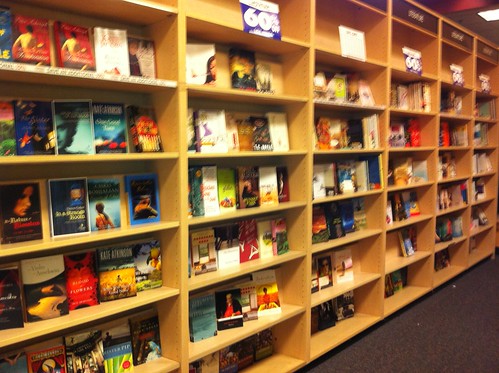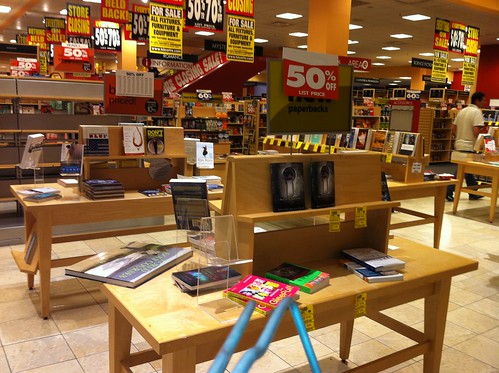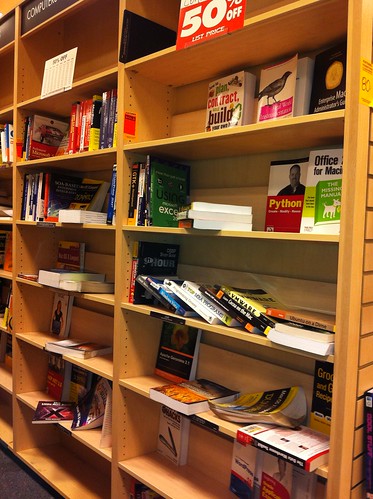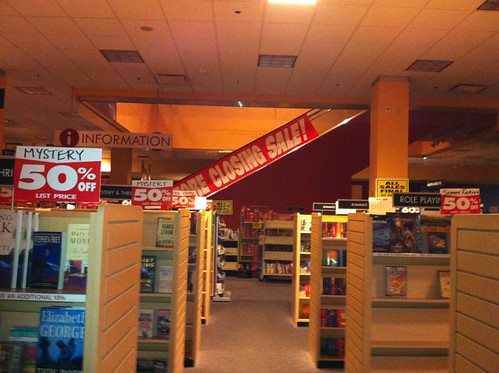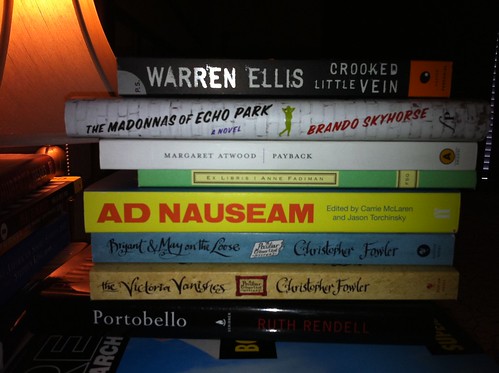I have not been the most consistent and regular odd book blogger as of late. I failed to write as much as I wanted in 2011, and I also read far less than I expected. Part of it was likely due to losing close to two months dealing with the Norway shooter’s manifesto. Hopefully 2012 will see more writing and reading.
But still, even as I did not get as much done in 2011 as I would have liked, I still got enough done to have another end-of-year list. My end-of-the-year lists aren’t “best of” lists. Rather, my list discusses the things I read in 2011 that resonated strongly with me. Good, bad, horrible, normal, weird – this list discusses all I read in 2011 that stayed with me, for whatever reason.
1) 2083 by Anders Behring Breivik
I discussed this monster in four verbose parts. It kicked my ass and continues to do so. It caused the dissolution of a long friendship (I am too liberal, it seems), it caused neckbeards to send me sickening messages regarding feminism (hint: I needed to make them a sandwich), and the articles remain the most-read articles on my site. This surprised me because I am a book blogger, not a political blogger, but after a while it made some sense. As far as I know, Jim Goad and I are the only damn people who read the thing in its entirety. Every discussion I read online about 2083 invariably contains the phrases, “Well, I didn’t read it, but…” or “I only read part of it, but from what I read…” So I suspect just the simple fact that I read the thing ensured some curiosity on the part of people who ordinarily wouldn’t read IROB and accounted for some of the traffic. It’s a curiosity thing – let’s see the cow with three heads and the dumb chick who read all of Breivik’s manifesto.
But amongst the race-hate and assorted nonsense, I met some very interesting people, and I count in those numbers even those I disagree with. I had a very interesting discussion with Baron Bodissey from Gates of Vienna, an e-mail exchange that, devoid of the repellent posturing I have come to associate with Islamophobia, explained much to me about the mindset of those who associated with Fjordman. But most important to me, I met many people from Norway who were deeply affected by the events of 7/22. Their stories humanized the whole nightmare for me, showing the direct impact of the 1518 pages. It became all too real for me.
In the midst of this, my words were translated into Norwegian, I was referenced a few times on MetaFilter, I was mocked and praised on endless discussion sites (the guys on Reddit think I am verbose, to which I cannot help but say, “No shit, Sherlock!”), and received so many e-mails I am surprised I managed to answer them all. This was the most intense experience of my blogging life.
2. Shoplifting From American Apparel by Tao Lin/The Tao Shoplifting Crisis by Canarsie House
Until I dared speak of mass murder in Norway, this review caused the most furor I had experienced online. The book stinks, I stated my case very plainly and with more words than the average Tao Lintern felt comfortable reading, and at the end of it, I wondered if I had stumbled into a cabal of neoists too bored by life even to be able to sneer properly. Many were appalled that I derived an opinion of Lin’s character from the thinly veiled autobiography he published as fiction. Oh the outrage I received from various people online followed by umpteen e-mails from people stating variations on the theme of, “Holy crap, I hate Tao Lin too but please don’t use my real name if you post this message.” But as terrible as this book was, it should not have been surprising that the experience of talking about it was more important than the experience of reading it.
Then I received a copy of a book containing e-mails between Tao Lin and the author Richard Grayson, who is also a lawyer, as well as being an excellent writer. I have not discussed this book yet and may not because it is very short, but you never know. In this exchange, my assumptions about Lin were more or less affirmed. Yet at the same time, I began to feel a sort of pity for the young man facing court over shoplifting charges and not knowing what to wear, needing to borrow money from a sibling to engage a lawyer, and more or less behaving as if he had no idea of how the world worked around him. It’s hard to reconcile the young man in those e-mails with the jaded asshole in Shoplifting from American Apparel.
3) Population Zero by Wrath James White
I plan to discuss this book on this site and here’s a review spoiler: It’s a very good book. It’s the tale of a vegan social worker who breaks with reality and begins to engage in aggressive population control methods. The characterization is excellent and this is no small feat because slipping into caricatures when dealing with a vegan is par for the course for too many writers. It also engages in some really extreme content without it ever coming across as exploitative.
But aside from loving this book, White’s tale had more punch for me because it proved that on some level my instincts about him were correct. I had first encountered White in the book he wrote with Edward Lee, Teratologist. Any attempt to describe the book must, by law, include the word execrable. I found White’s blog and grew to love his extemporaneous writing and wondered what the hell happened, how did Teratologist happen when he is clearly an interesting and erudite man? On the basis of his blog, I went ahead and read The Book of a Thousand Sins, a collection of short stories I discussed on this site. I didn’t give it a rave review but the strengths of the collection seemed at odds with the hot mess that was Teratologist. The problems in his writing struck me as the sort of things writers work out as they get better, and Population Zero proved that feeling was on the money. This book ensures that I will be reading a lot more of White’s work.
4) In the Eyes of Mr. Fury by Philip Ridley
Another book I plan to discuss here. A hauntingly beautiful book of local legends, family secrets, and confrontation, with deft touches of magical realism. I read this book on a lark, buying it online off my wishlist because the cover was appealing. It took me a long time to read it and when I finally did, it was one of those books that forced me to look up everything Ridley has written because I was appalled I missed out reading him for so long.
5) Miss Peregrine’s Home for Peculiar Children by Ransom Riggs
I plan to discuss this book here as well. This book was a nice, charming read that sort of fell flat for me. I appreciated the cleverness of the pictures and the story itself was sort of interesting but there was a definite lack of tension and the ending was not really an ending. I left it feeling like the book was jadedly setting up a series and therefore the book did not need to end in a substantively clear manner. In the wake of really absorbing young adult books, like the Harry Potter and Hunger Games series, this book was just… flat. Something was missing. I don’t know exactly what it is and it’s been niggling at me. It’s strange that a mediocre book would stay with me this long just because I can’t put my finger on why it’s mediocre, but there you go.
6) Sleeping Beauty III: Memorial Photography: The Children, from the archives of Stanley Burns, MD
Death photography, children… It should be clear why this book haunts me. This book also inspired Mr. Oddbooks to buy me an excellent piece of art for our anniversary. I display it with the book. This might seem morbid to some, but for me it was a perfect gift. Art often inspires connections with books, but it’s not often for me that books inspire connections to art. So that makes that tiny book of dead children all the more important for me, I think.

7) Hunger by Knut Hamson
This is one of the few books I read criticism about before I read it and it’s been a thorn in my side since I read it. My opinions on this book were at odds with the opinions of those who read this book and loved it. Auster, Bukowski, and Bly are likely better judges of the content but I will discuss how I deviated from their ideas when I discuss the book. I ended up feeling tight in the chest as I read. I wanted to yell at the protagonist, to tell him to just be reasonable, but of course such an artist cannot be reasonable. I had a similar feeling when I first read Edith Wharton’s The House of Mirth. I don’t know if closer examination will show any correlations between Lily Bart and Hunger‘s hero, but when my brain feels up to it, I will see if the two have anything in common. This book is definitely odd enough to discuss here, which I will do in the fullness of time.
8. Codex Seraphinianus by Luigi Serafini
Mr. Oddbooks got me a relatively inexpensive copy from Italy for my birthday and this book is a mindbend. I made it to the part I call “Weird Insects on Obstacle Course Islands” and had to stop. At times I have a tenuous hold on reality and this book challenged that hold. Honestly, this is a seriously odd book. Once I can finish absorbing all of it, I will discuss it here. This is a relatively expensive book, but you can have a look online. This is one of those books that really needs to be experienced in paper form but ultimately if you can’t shell out anywhere from $100 to $500 for a book, online is better than nothing.
9) The Ends of Our Tethers by Alasdair Gray
Definitely odd, definitely a book I will discuss here eventually, this book is one of those collections that seemed like it was written specifically for me. A character with a nasty skin condition, a clever but dissolute weirdo who gets the better of some teen punks, poets engaging in mind-fucks… This book was crammed with one-liners but was erudite enough in its execution that I did not feel like I was being forced to witness someone else’s cleverness as he showed off with words. This book may be the catalyst for me to start writing again. Experiencing that strange thrill when you read someone whose words show that there is someone on the planet whose mind sort of works like yours is a heady experience.
10) Room: A Novel by Emma Donoghue
I was skeptical at first because this book seemed like a “ripped from the headlines” sort of read. Such books can be fun to read but are seldom amazing. This was an exception, which should not have been surprising to me, as I have enjoyed Donoghue in the past. But even though this book seems very much inspired by actual crime and could have been a trashy read, it isn’t. Not close. This book is narrated by Jack, a five-year-old boy who lives in a room with his mother, who gave birth to him after her abductor imprisoned her for years in a small shed. Jack’s acquired language deficits seem strange given he was raised by a mother who spoke to him and read to him often, but that is a small criticism. This book was heartbreaking and gripping. There is a tense scene in the book so tightly written that my pulse accelerated reading it. This book was not strange enough to discuss here, but it is definitely worth a read.
I had a lot of strange stuff happen this year, Tao Lin and Norwegian killers notwithstanding. I managed to piss off a black metal god, as well as an author I really liked and whose work I discussed in depth on my site that predated IROB. I managed to do both without any intent to upset anyone. Also, this happened. Yet despite the haze of negativity that seemed a part of my online experience in 2011, this was actually a pretty good year. I read less than I wanted but I also managed to add significantly to my book collection, obtaining several rare or expensive books that I had wanted for a long time. I met some very interesting people (Ted the Romanian, Edward Sung, Evil Gringo, Iskwew, Omine, Bad Tara and so many others), and had a chance to start writing for other blogs, and though I did not take advantage of those opportunities the way I should have, perhaps in 2012 I will be more focused.
So let’s all have an excellent year in 2012 and if you feel so inclined, tell me of the books that made an impact on you in 2011. You guys lead me to the best books so don’t be shy or brief.



